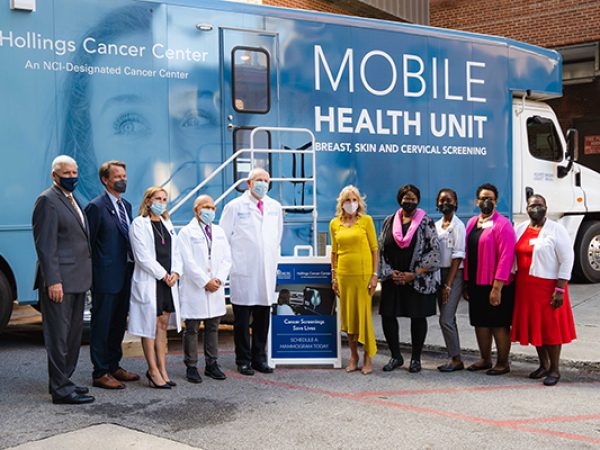Establishing Guidelines for Genetic Testing for Prostate Cancer
Prostate cancer is the most common non-skin cancer in men, and is the second leading cause of cancer-related death among men in the United States.

Although there are many factors that can increase the risk for prostate cancer, for a significant number of men it can be inherited. Among men with metastatic prostate cancer, 12 to 17 percent have been reported to have germline (inherited) genetic mutations, and among those with early stage disease, approximately 5 to 7 percent have germline mutations. Germline testing, which is hereditary cancer gene testing, is paving the way toward precision medicine and tailored screening approaches, and has the potential to revolutionize care.
Multiple genes have been associated with risk for prostate cancer. BRCA2, in particular, has been consistently associated with risk for prostate cancer, risk for aggressive disease, and is seen in higher rates in men with metastatic prostate cancer. HOXB13 is also a hereditary gene associated with risk for prostate cancer. Other genes in the DNA repair pathway have also been associated with prostate cancer, though to varying degrees. These genes include BRCA1, ATM, CHEK2, and the DNA mismatch repair genes. Identifying alterations in these genes may help guide precision therapy options, particularly in metastatic disease.
Another important implication of genetic testing: Genes linked with prostate cancer are also associated with hereditary cancer syndromes. Therefore, men with these genes may be at risk for additional cancers beyond prostate cancer and both men and women in their families could be at risk for other cancers such as breast, ovarian, pancreatic, colorectal, uterine, and kidney cancers.
In 2020, the U.S. Food and Drug Administration approved the PARP inhibitors rucaparib and olaparib for treatment of men with metastatic, castration-resistant prostate cancer with BRCA mutations or other DNA repair mutations whose cancer had not responded to standard lines of therapy, thus providing novel treatment options for these men.
As genetic testing has become more common in recent years, prostate cancer researchers identified some key challenges. For example, we noted variability in testing guidelines, increasing demand for genetic counseling, and increased ordering of genetic testing by non-genetic health care providers. In 2019, my colleagues and I at the Sidney Kimmel Cancer Center at Thomas Jefferson University convened the Philadelphia Prostate Cancer Consensus Conference with the overall goal to address these challenges. This consensus conference included multiple specialties such as urology, oncology, genetic counseling, population and implementation science, and patient advocates. Participants came from around the world and across practice settings. Multiple national organizations were represented to ensure a global perspective.
The multidisciplinary group of experts proposed an implementation framework to guide doctors and patients through the genetic evaluation process. Some of the key recommendations included:
- Discuss the purpose of genetic testing for therapeutic decision-making, clinical trial eligibility, identification of hereditary cancer syndromes, or cancer screening;
- Offer genetic testing to all men with metastatic disease;
- Recommend testing for men with strong family history of prostate cancer and consider history of other cancers and Ashkenazi Jewish ancestry when thinking of genetic testing;
- Provide optimal pretest informed consent. These elements should be discussed before testing: purpose of testing, potential to uncover hereditary cancer syndromes, types of results, Genetic Information Nondiscrimination Act (GINA), and cascade testing;
- Develop strategies for delivering pretest information with collaborative counseling models, telehealth, or videos;
- Offer broad genetic testing panels for men with metastatic prostate cancer with key DNA repair genes;
- Consider reflex testing in men with nonmetastatic disease or unaffected men and include DNA repair genes as well as additional genes based upon personal/family history;
- Consider eligibility for PARP inhibitors based on mutations in BRCA genes or other DNA repair genes;
- Include BRCA2 in prostate cancer screening discussions;
- Develop referral strategies to genetic counseling based on genetic results or suitable to practice and patient needs.
Multiple other areas were addressed, including priority research areas, particularly for African American populations, advocacy needs, and health care provider genetic education.
Overall, the consensus panel has been influential in creating uniform guidelines for genetic testing for prostate cancer, proposing testing strategies, endorsing BRCA2 testing across clinical scenarios, and advocating for collaboration with genetic counseling by urologists and oncologists. This Prostate Cancer Awareness Month, providers and patients should be aware of the hereditary risk for prostate cancer, and consider genetic testing for men with prostate cancer or at risk for prostate cancer to inform cancer screening and treatment to reduce cancer mortality for men and their families.
Veda N. Giri, MD, is an associate professor of Medical Oncology, Cancer Biology, and Urology, and director of the Cancer Risk Assessment and Clinical Cancer Genetics Program and the Men’s Genetic Risk Clinic at Sidney Kimmel Cancer Center – Jefferson Health at Thomas Jefferson University. She is a member of the American Association for Cancer Research.



